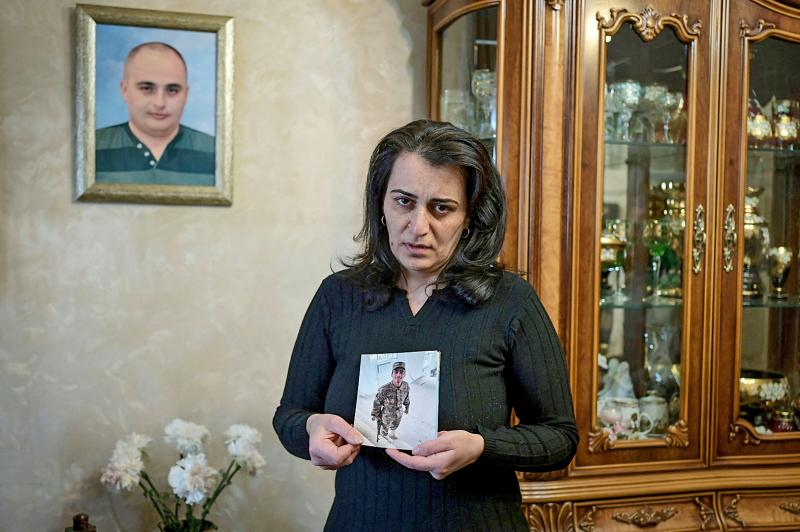Azerbaijan on Saturday released to Armenia 15 prisoners of war captured last year during hostilities over the Nagorno-Karabakh region, the Azerbaijani Ministry of Foreign Affairs in Baku said.
The ministry also said that under the deal mediated by Georgian Prime Minister Irakli Garibashvili, Yerevan reciprocated by providing Baku with maps of minefields in the conflict zone.
Fighting broke out between Azerbaijan and Armenia in September last year over Nagorno-Karabakh, claiming about 6,000 lives over six weeks.

Photo: AFP
The war ended in November with a Russian-brokered ceasefire, under which Yerevan ceded swathes of territory that it had controlled for decades.
On Saturday, “Azerbaijan handed over to Armenia 15 detained Armenians in exchange for the map of 97,000 anti-tank and anti-personnel mines in the Agdam district,” one of the territories that Armenia ceded to Baku, the Azerbaijani Ministry of Foreign Affairs said in a statement.
The ministry also thanked US Secretary of State Antony Blinken, US Acting Assistant Secretary of State for Europe and Eurasia Philip Reeker, European Council President Charles Michel and Sweden’s chairmanship of the Organisation for Security and Cooperation in Europe (OSCE) for their roles in the negotiations.
“Our brothers returned to their families thanks to the efforts of Georgia’s Prime Minister Irakli Garibashvili, our Georgian brothers, as well as our partners from the US and EU,” Armenian Prime Minister Nikol Pashinyan told journalists.
He said that he had earlier “provided Azerbaijan with a certain number of minefield maps through Russian Minister of Foreign Affairs Sergei Lavrov.”
Garibashvili’s office said in a statement: “An important step has been made toward the amelioration of the security environment in the South Caucasus region.”
A senior EU diplomat said that Michel helped broker “parallel humanitarian gestures” prior to the agreement’s announcement.
Michel said that he considered it “a first step toward renewing confidence, an effort the EU is ready to fully support.”
Russia, which has deployed peacekeeping troops to Karabakh, also welcomed the move.
“Wonderful and long-awaited news. We welcome such steps,” Russian Ministry of Foreign Affairs spokeswoman Maria Zakharova said on Telegram.
Nagorno-Karabakh is one of the most heavily mined places in the former Soviet Union.
Seven Azerbaijani troops and 18 civilians have died, and 110 have been wounded by mines in and near Nagorno-Karabakh since the ceasefire, the Azerbaijani government said.
Azerbaijani and Armenian forces planted mines during a conflict in the early 1990s.
Tensions have again been running high since May, when Armenia accused Azerbaijan’s military of crossing its southern border to “lay siege” to a shared lake.
Pashinyan at the time asked Russian President Vladimir Putin for military support.
Moscow said that it would help with the delimitation and demarcation of the neighbors’ borders.
Aliyev last month said that Azerbaijan was ready for peace talks with Armenia, while Pashinyan later announced that the two ex-Soviet nations were holding discussions on the delimitation and demarcation of their shared borders.
Ethnic Armenian separatists in Nagorno-Karabakh broke away from Azerbaijan as the Soviet Union collapsed, and the ensuing conflict has claimed about 30,000 lives.

Asian perspectives of the US have shifted from a country once perceived as a force of “moral legitimacy” to something akin to “a landlord seeking rent,” Singaporean Minister for Defence Ng Eng Hen (黃永宏) said on the sidelines of an international security meeting. Ng said in a round-table discussion at the Munich Security Conference in Germany that assumptions undertaken in the years after the end of World War II have fundamentally changed. One example is that from the time of former US president John F. Kennedy’s inaugural address more than 60 years ago, the image of the US was of a country

Cook Islands officials yesterday said they had discussed seabed minerals research with China as the small Pacific island mulls deep-sea mining of its waters. The self-governing country of 17,000 people — a former colony of close partner New Zealand — has licensed three companies to explore the seabed for nodules rich in metals such as nickel and cobalt, which are used in electric vehicle (EV) batteries. Despite issuing the five-year exploration licenses in 2022, the Cook Islands government said it would not decide whether to harvest the potato-sized nodules until it has assessed environmental and other impacts. Cook Islands Prime Minister Mark Brown

BLIND COST CUTTING: A DOGE push to lay off 2,000 energy department workers resulted in hundreds of staff at a nuclear security agency being fired — then ‘unfired’ US President Donald Trump’s administration has halted the firings of hundreds of federal employees who were tasked with working on the nation’s nuclear weapons programs, in an about-face that has left workers confused and experts cautioning that the Department of Government Efficiency’s (DOGE’s) blind cost cutting would put communities at risk. Three US officials who spoke to The Associated Press said up to 350 employees at the National Nuclear Security Administration (NNSA) were abruptly laid off late on Thursday, with some losing access to e-mail before they’d learned they were fired, only to try to enter their offices on Friday morning

STEADFAST DART: The six-week exercise, which involves about 10,000 troops from nine nations, focuses on rapid deployment scenarios and multidomain operations NATO is testing its ability to rapidly deploy across eastern Europe — without direct US assistance — as Washington shifts its approach toward European defense and the war in Ukraine. The six-week Steadfast Dart 2025 exercises across Bulgaria, Romania and Greece are taking place as Russia’s invasion of Ukraine approaches the three-year mark. They involve about 10,000 troops from nine nations and represent the largest NATO operation planned this year. The US absence from the exercises comes as European nations scramble to build greater military self-sufficiency over their concerns about the commitment of US President Donald Trump’s administration to common defense and